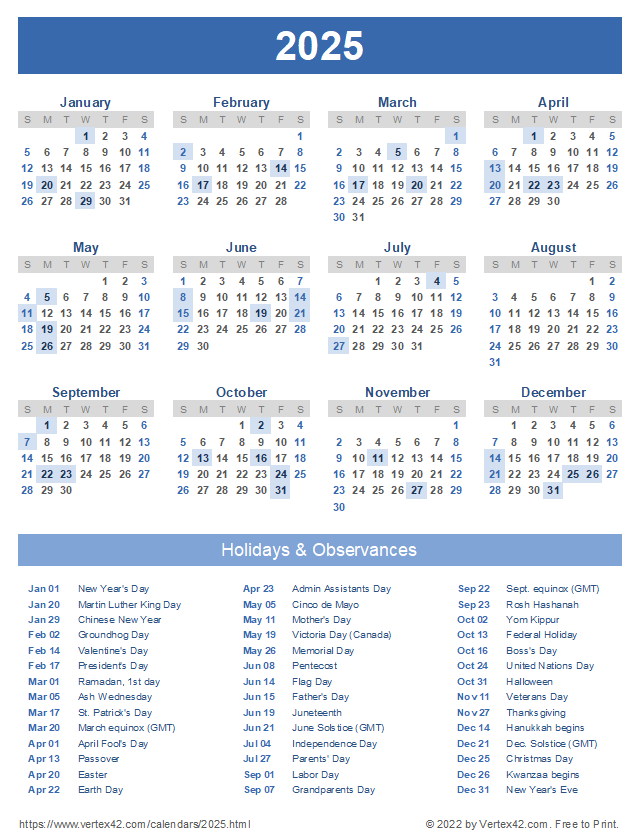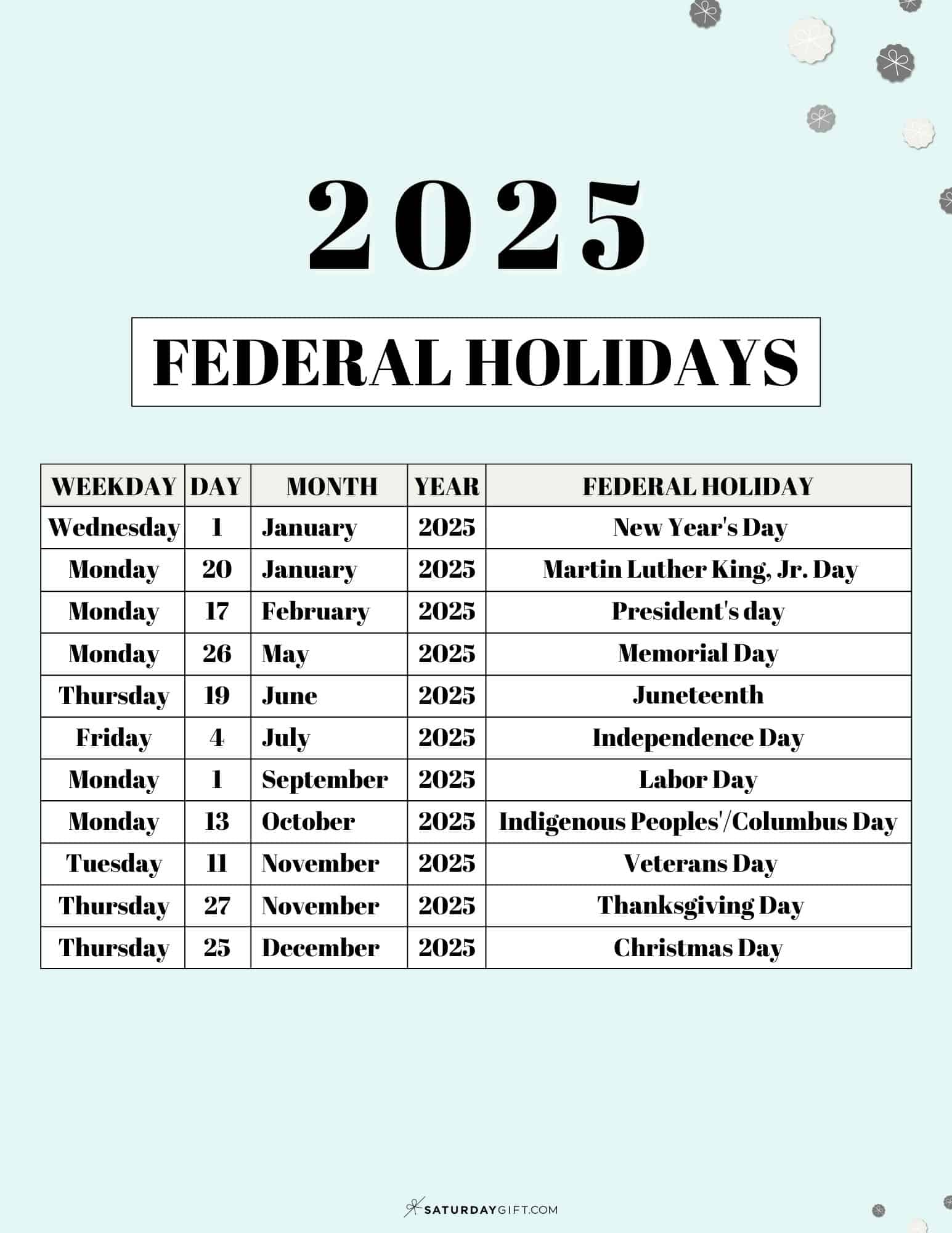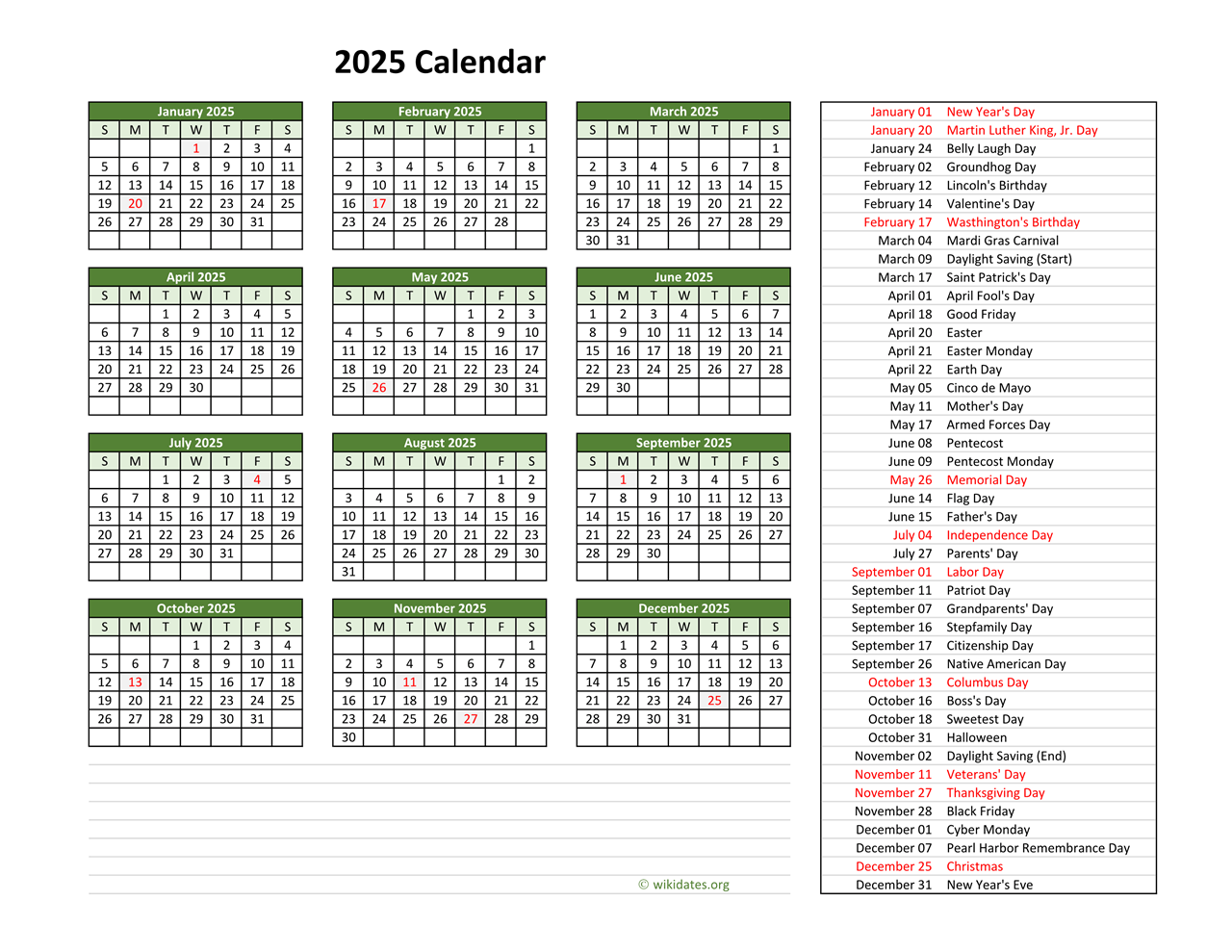Navigating the Calendar: Major US Holidays in 2025
Related Articles: Navigating the Calendar: Major US Holidays in 2025
Introduction
With great pleasure, we will explore the intriguing topic related to Navigating the Calendar: Major US Holidays in 2025. Let’s weave interesting information and offer fresh perspectives to the readers.
Table of Content
Navigating the Calendar: Major US Holidays in 2025

The United States observes a diverse array of holidays throughout the year, each reflecting significant historical, cultural, and religious traditions. These holidays provide opportunities for reflection, celebration, and connection, fostering a sense of national unity and shared experience.
January
- New Year’s Day (Wednesday, January 1st): This holiday marks the beginning of a new year and is celebrated with festivities, resolutions, and a sense of optimism for the future.
- Martin Luther King Jr. Day (Monday, January 20th): This federal holiday honors the life and legacy of Dr. Martin Luther King Jr., a pivotal figure in the Civil Rights Movement. It serves as a reminder of his fight for equality and justice for all Americans.
February
- Presidents’ Day (Monday, February 17th): This holiday, observed on the third Monday of February, commemorates the birthdays of George Washington and Abraham Lincoln, two iconic figures in American history. It offers an opportunity to reflect on their contributions and the principles of democracy they embodied.
May
- Memorial Day (Monday, May 26th): This solemn holiday honors the sacrifices of men and women who died while serving in the United States Armed Forces. It is a time for remembrance and gratitude for their ultimate commitment to the nation.
June
- Juneteenth National Independence Day (Friday, June 19th): This federal holiday marks the emancipation of enslaved African Americans in the United States, commemorating the day in 1865 when Union General Gordon Granger announced the end of slavery in Texas. It signifies a pivotal moment in the fight for freedom and equality.
July
- Independence Day (Wednesday, July 4th): This national holiday celebrates the signing of the Declaration of Independence in 1776, marking the birth of the United States as an independent nation. It is a day for fireworks, parades, and a reaffirmation of the ideals of freedom and self-governance.
September
- Labor Day (Monday, September 1st): This holiday honors the contributions of working people to the nation’s prosperity. It is a time to recognize the importance of labor unions and the rights of workers.
October
- Columbus Day (Monday, October 13th): This holiday, observed on the second Monday of October, commemorates the arrival of Christopher Columbus in the Americas in 1492. However, it has been subject to controversy due to its historical inaccuracies and the negative impact of colonization on indigenous peoples.
November
- Veterans Day (Wednesday, November 11th): This holiday honors all veterans who have served in the United States Armed Forces. It is a day to express gratitude for their service and sacrifice.
- Thanksgiving Day (Thursday, November 27th): This national holiday is a time for families and friends to gather and give thanks for the blessings of the past year. It is celebrated with a traditional feast featuring turkey, stuffing, and other festive dishes.
December
- Christmas Day (Wednesday, December 25th): This religious holiday celebrates the birth of Jesus Christ. It is widely observed as a time for family gatherings, gift-giving, and festive decorations.
- New Year’s Eve (Tuesday, December 31st): This holiday marks the end of the year and is often celebrated with parties, countdown events, and a reflection on the past year.
FAQs by Major US Holidays in 2025
New Year’s Day:
-
Q: Is New Year’s Day a federal holiday?
- A: Yes, New Year’s Day is a federal holiday in the United States.
Martin Luther King Jr. Day:
-
Q: What is the significance of Martin Luther King Jr. Day?
- A: This holiday honors Dr. Martin Luther King Jr.’s legacy of fighting for racial equality and justice.
Presidents’ Day:
-
Q: Why is Presidents’ Day celebrated on the third Monday of February?
- A: The holiday was established in 1971 to create a three-day weekend for federal employees, combining Washington’s and Lincoln’s birthdays.
Memorial Day:
-
Q: How is Memorial Day observed?
- A: It is a solemn day of remembrance with ceremonies at cemeteries and memorials, honoring those who died in military service.
Juneteenth National Independence Day:
-
Q: What is the significance of Juneteenth?
- A: It marks the emancipation of enslaved African Americans in the United States, signifying the end of slavery and a pivotal moment in the fight for freedom and equality.
Independence Day:
-
Q: What are some traditional activities for Independence Day?
- A: Fireworks displays, parades, barbecues, and picnics are common ways to celebrate.
Labor Day:
-
Q: What is the purpose of Labor Day?
- A: It honors the contributions of working people and recognizes the importance of labor unions in protecting workers’ rights.
Columbus Day:
-
Q: Why is Columbus Day controversial?
- A: It has been criticized for its historical inaccuracies and the negative impact of colonization on indigenous peoples.
Veterans Day:
-
Q: How is Veterans Day observed?
- A: It is a day to thank veterans for their service and sacrifice, often with parades, ceremonies, and special discounts for veterans.
Thanksgiving Day:
-
Q: What is the origin of Thanksgiving?
- A: It originated from a harvest festival celebrated by early American colonists, evolving into a national holiday for giving thanks.
Christmas Day:
-
Q: What are some traditions associated with Christmas?
- A: Gift-giving, decorating Christmas trees, attending church services, and sharing meals with family and friends are common traditions.
New Year’s Eve:
-
Q: What are some ways to celebrate New Year’s Eve?
- A: Parties, countdown events, fireworks displays, and making resolutions are popular ways to celebrate.
Tips by Major US Holidays in 2025
New Year’s Day:
- Tip: Start the year with a fresh perspective. Reflect on the past year and set goals for the new one.
Martin Luther King Jr. Day:
- Tip: Engage in community service or volunteer work to honor Dr. King’s legacy of service to others.
Presidents’ Day:
- Tip: Visit a historical landmark or museum to learn more about the lives and contributions of George Washington and Abraham Lincoln.
Memorial Day:
- Tip: Attend a Memorial Day ceremony or visit a cemetery to honor those who died in service to the nation.
Juneteenth National Independence Day:
- Tip: Learn about the history of Juneteenth and the ongoing fight for racial justice in the United States.
Independence Day:
- Tip: Participate in local parades or fireworks displays, or host a barbecue with friends and family.
Labor Day:
- Tip: Support local businesses and workers by shopping at small businesses or attending a labor union event.
Columbus Day:
- Tip: Learn about the history of Native Americans and the impact of colonization on their communities.
Veterans Day:
- Tip: Thank a veteran for their service or participate in a Veterans Day parade or ceremony.
Thanksgiving Day:
- Tip: Spend time with family and friends, express gratitude for blessings, and share a traditional Thanksgiving meal.
Christmas Day:
- Tip: Focus on the true meaning of Christmas, spending time with loved ones and sharing acts of kindness.
New Year’s Eve:
- Tip: Reflect on the past year and set positive intentions for the new year.
Conclusion by Major US Holidays in 2025
The holidays observed in the United States provide opportunities for reflection, celebration, and connection, fostering a sense of national unity and shared experience. Each holiday carries its own unique significance, reminding us of our nation’s history, cultural traditions, and shared values. By understanding the origins and importance of these holidays, we can deepen our appreciation for the diverse tapestry of American culture and participate in meaningful ways.








Closure
Thus, we hope this article has provided valuable insights into Navigating the Calendar: Major US Holidays in 2025. We appreciate your attention to our article. See you in our next article!
